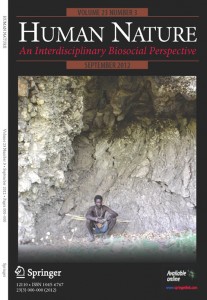
Human Nature, Online First™ – SpringerLink for subscribers
Cover: Contemplative Hadza forager takes a break while out on a daily walkabout. (Photo by Frank W. Marlowe, 2006, Tanzania. Cover image credit: Springer Science + Media)
Abstract: We present a cross-cultural analysis showing that the presence of an active or moral High God in societies varies generally along a continuum from lesser to greater technological complexity and subsistence productivity. Foragers are least likely to have High Gods. Horticulturalists and agriculturalists are more likely. Pastoralists are most likely, though they are less easily positioned along the productivity continuum. We suggest that belief in moral High Gods was fostered by emerging leaders in societies dependent on resources that were difficult to manage and defend without group cooperation. These leaders used the concept of a supernatural moral enforcer to manipulate others into cooperating, which resulted in greater productivity. Reproductive success would accrue most to such leaders, but the average reproductive success of all individuals in the society would also increase with greater productivity. Supernatural enforcement of moral codes maintained social cohesion and allowed for further population growth, giving one society an advantage in competition with others.